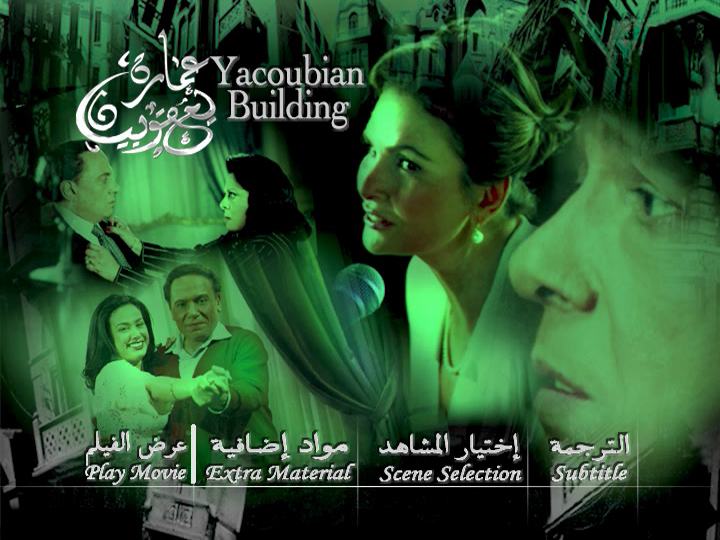The Yacoubian Building عمارة يعقوبيان
2006.161 Minutes. Not Rated.
I passed an article in the September issue of Conde Nast Traveler (of all places) featuring the trailblazing work of Alaa Al Aswany, who was educated in Chicago to be a dentist. Incidentally, he ended up penning a pioneering work, The Yacoubian Building.

The Yacoubian Building عمارة يعقوبيان
Al Aswany worked with Wahid Hamid on the screenplay that transformed his evocative work to the big screen with the help of the rather astute direction of Mr. Marwan Hamed. The story of contemporary Egypt not only reached the American screen in timely fashion, but it foretold of the revolution that shook the Middle East, and the world, last spring (the Arab Spring). I am sure the movie had a role in garnering greater sympathy from world viewers (we knew the revolution was coming, didn’t we?) but it also characterized the collective angst of the Egyptian population in dealing with current issues of class, economics, religion, politics, and relationships, between men and women, between slave and master, and between men and other men.
For an Egyptian film it is racy, and perhaps simultaneously both difficult to watch and enchanting. Al Aswany quilts a story that is stitched together with disparate scenes and stories that are intricately woven into a larger story about Egyptian society. A society that clearly is poised to undergo a difficult transformation.
The film is centered around one apartment building, The Yacoubian, with a story spun on each floor. Each floor is a path to self discovery, a sort of web from which Egyptians must free themselves or suffer the consequences. For most viewers, the film might be hard to digest. Lower class workers live on the rooftop; women subject themselves to sexual harassment to keep a job; men marry again under religious pretext to satisfy their sexual desire; and powerful men broker deals that make Wall Street look tame in comparison—all from within the confines of the Yacoubian, the symbol of a convoluted hierarchy.
The collective tension in the Yacoubian is revealed through a power differential that is often unraveled through a rather strange obsession with sex. And sex is the surrogate for larger issues about societal relationships. A gay journalist uses sex to feel useful; a businessman uses sex, and religion, as a pretext to take another wife; a woman tries to free herself from an employer who uses her presence as an invitation to have sex—because she is there and needs her job.
And within this struggle to creatively (or destructively) embrace societal taboos, is a struggle among common Egyptians to find their identity and independence amidst poverty. This identity involves a loyal patriotism (challenged) for a country that generally disregards their struggles. A smart student is denied a post with the police because his father is a janitor (a nobody in the eyes of the elite); and the man turns to religion as a way of exacting revenge. Another woman defies her oppressed place (role) and seeks an emancipating relationship as an equal to another man. And so the Yacoubian is a story about those who cannot feed their kids, those who cannot find jobs, those who must put up with insults and humiliation in a society that allows no social mobility, a sort of predetermined, fatalistic culture that ignores opportunity.
The film does not unravel a society’s neuroses through sex, but a general dysfunction about the way a society has “managed” its image against the rest of the world, highlighting its inequalities and corruption. There is a subtext about European values and their place in a broken Egypt. One champion of a new Egypt, Zaki “Pasha” El Dessouki (Adel Imam), is the aged but wise voice of an older Egypt, an age that was greater than anything Paris could have produced. And while Zaki longs for those days he is realistic that Egypt (Cairo) is a slave to its own fate, or is it? Zaki is the Egyptians’ quiet cosmopolitan hero: an educated man who is refined and cultured in the ways of the world; secular in approach and artistic in his embrace. He calls Egypt’s current state the “age of deformity.” Though he is helpless to change the societal structure, he is hopeful that something will change. His country is like the music of another land: it is not language that defines it, but the way it feels and the way we interpret it that matter. As he says at one point: “Whoever put the mule in the minaret can get it down.” And though Zaki is in no position to extract the mule from the tower, he is quietly moving on with or without Egypt. As the voice of Edith Piaf plays throughout the lounge while Zaki and his new love dream of Paris and sip on wine, viewers get the feeling that something great is bound to happen. We are curiously attentive when one character in the film says: “We are different from foreigners.” They are different, but we know before watching the film how this story turns out. As the finale hurls itself toward disaster, we know the story is still being written. Our sympathies are with Egypt and we have stepped upon a courageous people, forcing change nobody knew would happen the way it did, but inevitable giving the events that unfold, magnificently, on the screen.
This is history, politics and power in a rather robust artistic display. The Yacoubian is the change agent all filmmakers wish their craft foretold and facilitated.
Excerpt from the book HERE
